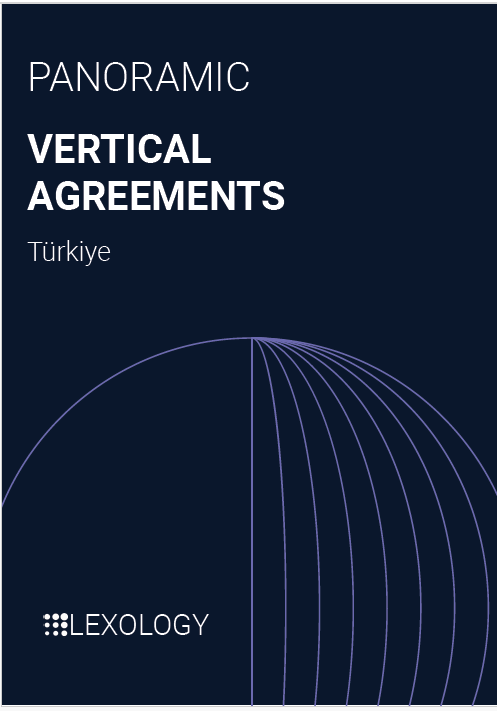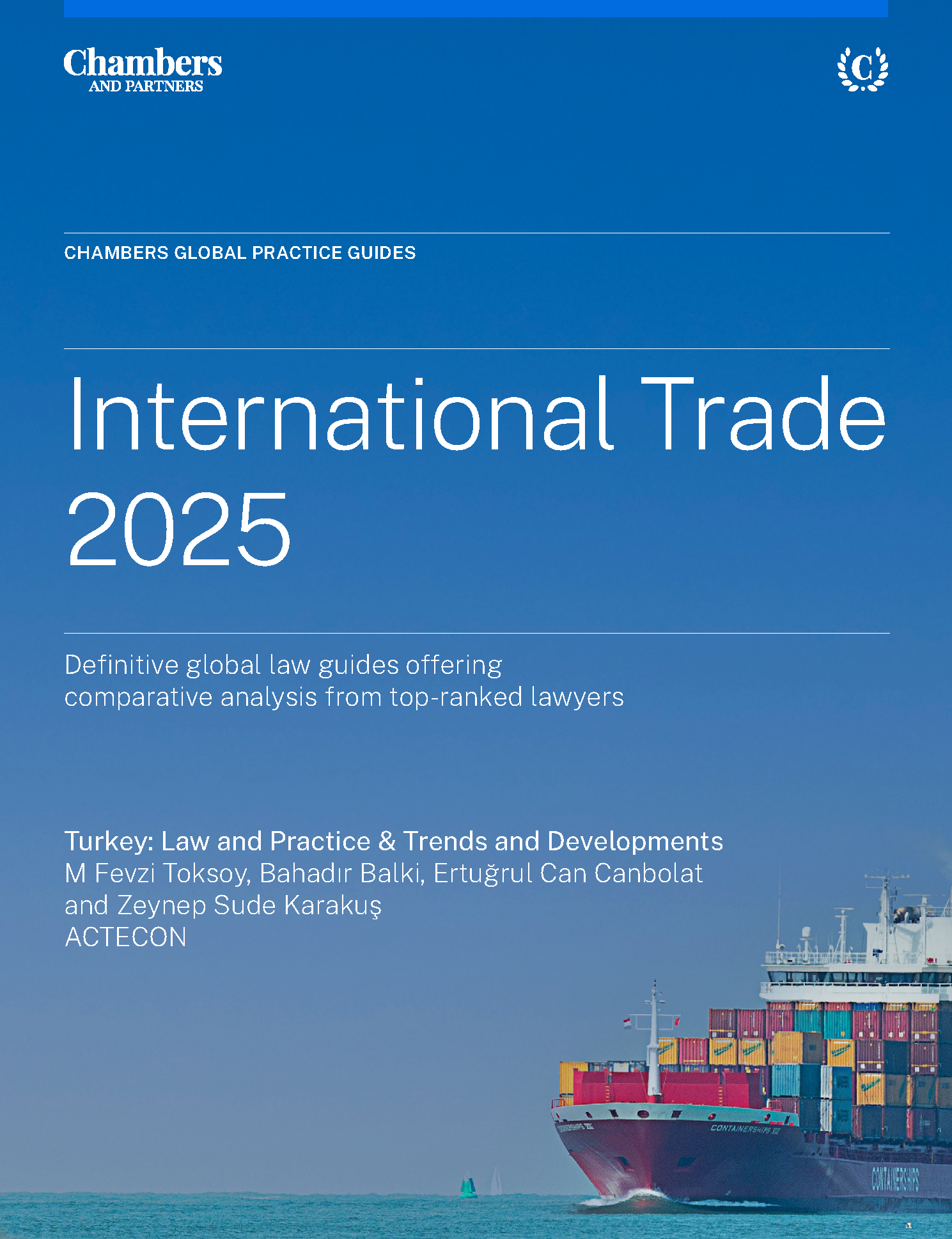Turkey's Recent Trade Policy Investigations: Some Completed, Others Launched
| International Trade

Turkey's Recent Trade Policy Investigations: Some Completed, Others Launched
Article by Ertuğrul Can Canbolat, and Hasan Güden
The Turkish Ministry of Trade ("Ministry") adopted, by the end of 2018 and in early 2019, several communiqués in the area of trade defence. While some of those communiqués are marking the end of existing investigations, others are initiating new investigations.
The Ministry's four recent communiqués concerning trade will be treated below by drawing a distinction according to whether they terminate an investigation or whether they start a new one.
Closing Communiqués
1. Expiry Review on Imports of Welded Stainless Steel Tubes, Pipes and Profiles
The Ministry instated in 2013 anti-dumping measures on imports of welded stainless steel tubes, pipes and profiles1 originating in China (13.82-25.27%) and Chinese Taipei (7.98%-14.65%)2.
The Ministry had to check whether the subject imports have undercut or depressed the relevant Turkish domestic industry's prices. Accordingly, the Ministry has determined that while there was no price undercutting as regards imports originating in China, those originating in Chinese Taipei undercut the domestic industry's prices at a rate ranging between 1% and 9%. Thereafter, the Ministry established a price suppression rate ranging from 1% to 9% with respect to imports originating in China and another rate between 10% to 19% concerning imports originating in Chinese Taipei.
The Ministry found that the positive trend observed in certain of the domestic industry's economic indicators – namely capacity utilization rate, domestic and sales, employment, wages, and market share – are reasonable for an industry that has started its activities in the second half of 2015. Nevertheless, the negative trend in inventories, profitability and cashflow has also been noted.
The Ministry considered that the expiry of the concerned measures would lead to a shift in the demand for the subject products. The production capacity of the subject countries, their level of knowledge of and ease of access to the Turkish market are reasons, among others, put forth by the Ministry to assess that an expiry of the applicable measures would be likely to lead to a continuation or recurrence of dumping and injury.
Eventually, the Ministry decided, through the application of the lesser duty rule, to extend the applicable anti-dumping measures by reducing the rates established following the original investigation. Accordingly, the current measures applicable to the subject imports read as follows:
|
CN Code |
Country |
Company Name |
Measure (% of the CIF price) |
|
7306.40.20.90.00 |
Chinese Taipei |
YC Inox Co., Ltd. |
7.98 |
|
Froch Enterprise Co., Ltd. |
7.98 |
||
|
Others |
11.50 |
||
|
7306.40.80.90.00 |
China |
Foshan Vinmay Stainless Steel Co., Ltd. |
13.82 |
|
Foshan Nanhai Quixun Stainless Steel Product Co., Ltd. |
20.50 |
||
|
7306.61.10.00.00 |
Others |
20.50 |
2. Expiry Review on Imports of Woven Fabrics of Synthetic and Artificial Stable Fibers
The Ministry had to conduct this investigation concerning a measure in force since 2001. Indeed, imports of woven fabrics of synthetic and artificial stable fibers originating in China have been imposed an anti-dumping duty of 87% of the CIF price3. This measure underwent two expiry reviews – both of which extended the application of the measure – following the original implementation period4. The Ministry recently taken its decision in the context of the third review investigation5.
One of the salient points of this last review is that the Ministry carried out its assessment by considering the subject products as a whole despite differences between the concerned products as regards, among others, their import quantities. Indeed, the Ministry indicated that those products are not independent, have similar areas of use, and are substitutable.
As far as price effects are concerned, the Ministry determined the rates of both price undercutting and price depression ranges from 20% to 29%. The Ministry also found that although the domestic industry's production, domestic sales, production capacity, capacity utilization rate, efficiency, inventory turnover, and market share followed a positive trend during the review period, the negative trend of other economic indicators as profitability and employment seems to have sufficed for the Ministry to establish that the expiry of the applicable measure would be likely to lead to a continuation or recurrence of dumping and injury.
Following its analysis of the Chinese market6, the Ministry found (i) that the size and the growth prospect of the Turkish market make it attractive for Chinese exports, (ii) that exports of the subject products could easily be diverted to Turkey due to the price elasticity of demand, and (iii) that the Turkish market is easily accessible for Chinese producers/exporters whose production is devoted in major part to export and who know well the characteristics of the Turkish market.
Taking into consideration, as a whole, the fact that the products concerned are inputs, the price effects of the subject imports, and the affected economic indicators of the domestic industry, the Ministry decided that the expiry of the applicable measure would be likely to lead to a continuation or recurrence of dumping and injury.
Eventually, considering that the implementation of the lesser duty rule would suffice to eliminate the domestic industry's injury, the Ministry reduced the rate of the measure from 87.4 % to 44%.
Initiation Communiqués
1. Safeguard Investigation on Imports of Nylon Yarn and other Polyamides
The Ministry launched, against all countries, a safeguard investigation concerning imports of nylon yarn and other polyamides falling within the CN codes 5402.31, 5402.32.00.00.00, 5402.45, and 5402.51, 5402.617. Polyamide yarn is principally used in the production of swimwear, underwear, and socks. Embroiderers and textile manufacturers/exporters may also be stakeholders in this investigation. Countries from whom Turkey imports the most the concerned products and the corresponding import quantity are as follows8:
|
Import Quantity (kg) |
|||||
|
2014 |
2015 |
2016 |
2017 |
2018 (Jan-Sept) |
|
|
Chinese Taipei |
4,468,121 |
3,354,710 |
2,910,852 |
5,180,358 |
6,533,073 |
|
China |
3,753,273 |
3,128,838 |
4,771,319 |
7,260,217 |
4,325,301 |
|
Italy |
4,475,858 |
3,414,805 |
2,938,587 |
3,734,688 |
2,176,148 |
|
Germany |
1,617,244 |
2,173,050 |
2,124,602 |
2,664,018 |
1,746,038 |
|
South Korea |
808,865 |
633,770 |
1,036,789 |
1,356,789 |
1,691,635 |
|
Russia |
853,346 |
1,075,349 |
194,978 |
1,912,138 |
1,542,218 |
2. Expiry Review on Imports of Woven Fabrics of Synthetic and Artificial Stable Fibers
The Ministry established, in 2009, the following measures concerning imports of yarn of man-made or synthetic or artificial staple fibres falling within the CN codes 55.08, 55.09 (except 5509.52, 5509.61, 5509.91), 55.10 (except 5510.20) and 55.119:
|
Country |
Measure (USD/kg) |
|
China |
0.49 – 0.80 |
|
Indonesia |
0 – 0.40 |
|
India |
0.29 – 0.39 |
The Ministry then decided to extend those measures in 2015 following the conduct of an expiry review investigation10.
In the course of 2014, another original investigation covering the same products resulted in the imposition of the following anti-dumping measures against imports originating in Malaysia, Pakistan, Thailand, and Vietnam11:
|
Country |
Measure (% of the CIF price) |
|
Malaysia |
11.26 – 18.32 |
|
Pakistan |
6.62 – 12.18 |
|
Thailand |
7.79 – 20.24 |
|
Vietnam |
19.48 – 26.25 |
The Ministry joined the two cases for the purpose of the newly initiated expiry review and will thus conduct its investigation concerning imports of the subject products originating in all the six countries concerned to determine whether the expiry of the currently applicable measures would be likely to lead to a continuation or recurrence of dumping and injury.
Footnotes
1 Those products are classified under the CN codes 7306.40.20.90.00, 7306.40.80.90.00, and 7306.61.10.00.00.
2 See Communiqué no 2013/4 published on 15 March 2013 in the Turkish Official Gazette no 28588 for the closing communiqué of the original investigation.
3 For the communiqué closing the original investigation, see Communiqué 2001/2 published on 15 February 2001 in the Turkish Official Gazette no 24319. The products subject to investigation are classified under the CN codes 5513, 5514, 5515, and 5516.
4 The concerned reviews have been concluded, respectively, in 2007 and 2013.
5 See Communiqué 2019/4 published on 31 December 2018 in the Turkish Official Gazette no 30642.
6 Which focused on China's growth prospects, the consolidation of the textile and apparel in China, China's production capacity and export performance, and the evolution of Chinese exports' unit prices (especially to countries surrounding Turkey).
7 See Communiqué no 2018/9 published on 30 December 2018 in the Turkish Official Gazette no 30641.
8 Those data are those that have been collected from the Turkish Statistical Institute's database and that have been submitted by complainants in their application.
9 For the communiqué closing the original investigation, see Communiqué 2009/1 published on 12 January 2009 in the Turkish Official Gazette no 27108.
10 See Communiqué 2015/8 published on 17 April 2015 in the Turkish Official Gazette no 29329.
11 For the closing communiqué of this second original investigation, see Communiqué 2014/2 published on 8 April 2014 in the Turkish Official Gazette no 28966.







